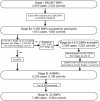Genome-wide association study in east Asians identifies novel susceptibility loci for breast cancer
- PMID: 22383897
- PMCID: PMC3285588
- DOI: 10.1371/journal.pgen.1002532
Genome-wide association study in east Asians identifies novel susceptibility loci for breast cancer
Abstract
Genetic factors play an important role in the etiology of both sporadic and familial breast cancer. We aimed to discover novel genetic susceptibility loci for breast cancer. We conducted a four-stage genome-wide association study (GWAS) in 19,091 cases and 20,606 controls of East-Asian descent including Chinese, Korean, and Japanese women. After analyzing 690,947 SNPs in 2,918 cases and 2,324 controls, we evaluated 5,365 SNPs for replication in 3,972 cases and 3,852 controls. Ninety-four SNPs were further evaluated in 5,203 cases and 5,138 controls, and finally the top 22 SNPs were investigated in up to 17,423 additional subjects (7,489 cases and 9,934 controls). SNP rs9485372, near the TGF-β activated kinase (TAB2) gene in chromosome 6q25.1, showed a consistent association with breast cancer risk across all four stages, with a P-value of 3.8×10(-12) in the combined analysis of all samples. Adjusted odds ratios (95% confidence intervals) were 0.89 (0.85-0.94) and 0.80 (0.75-0.86) for the A/G and A/A genotypes, respectively, compared with the genotype G/G. SNP rs9383951 (P = 1.9×10(-6) from the combined analysis of all samples), located in intron 5 of the ESR1 gene, and SNP rs7107217 (P = 4.6×10(-7)), located at 11q24.3, also showed a consistent association in each of the four stages. This study provides strong evidence for a novel breast cancer susceptibility locus represented by rs9485372, near the TAB2 gene (6q25.1), and identifies two possible susceptibility loci located in the ESR1 gene and 11q24.3, respectively.
Conflict of interest statement
The authors have declared that no competing interests exist.
Figures




References
-
- Nathanson KL, Wooster R, Weber BL. Breast cancer genetics: what we know and what we need. Nat Med. 2001;7:552–556. - PubMed
-
- Stacey SN, Manolescu A, Sulem P, Rafnar T, Gudmundsson J, et al. Common variants on chromosomes 2q35 and 16q12 confer susceptibility to estrogen receptor-positive breast cancer. Nat Genet. 2007;39:865–869. - PubMed
Publication types
MeSH terms
Substances
Grants and funding
- CA54281/CA/NCI NIH HHS/United States
- R01 CA122756/CA/NCI NIH HHS/United States
- R01CA122756/CA/NCI NIH HHS/United States
- R01CA148667/CA/NCI NIH HHS/United States
- R01 CA092585/CA/NCI NIH HHS/United States
- R01 CA064277/CA/NCI NIH HHS/United States
- R01 CA148667/CA/NCI NIH HHS/United States
- R37CA070867/CA/NCI NIH HHS/United States
- CA132839/CA/NCI NIH HHS/United States
- R01CA124558/CA/NCI NIH HHS/United States
- R01CA092585/CA/NCI NIH HHS/United States
- R01CA64277/CA/NCI NIH HHS/United States
- P30 CA68485/CA/NCI NIH HHS/United States
- R37 CA070867/CA/NCI NIH HHS/United States
- Z01 BC011118/ImNIH/Intramural NIH HHS/United States
- CA63464/CA/NCI NIH HHS/United States
- R01 CA118229/CA/NCI NIH HHS/United States
- R01 CA124558/CA/NCI NIH HHS/United States
- R01CA118229/CA/NCI NIH HHS/United States
- R01 CA063464/CA/NCI NIH HHS/United States
- R01 CA054281/CA/NCI NIH HHS/United States
- U01 CA063464/CA/NCI NIH HHS/United States
- R01 CA132839/CA/NCI NIH HHS/United States
- P30 CA068485/CA/NCI NIH HHS/United States
- R01 CA137013/CA/NCI NIH HHS/United States
- R37 CA054281/CA/NCI NIH HHS/United States
LinkOut - more resources
Full Text Sources
Other Literature Sources
Medical
Miscellaneous

